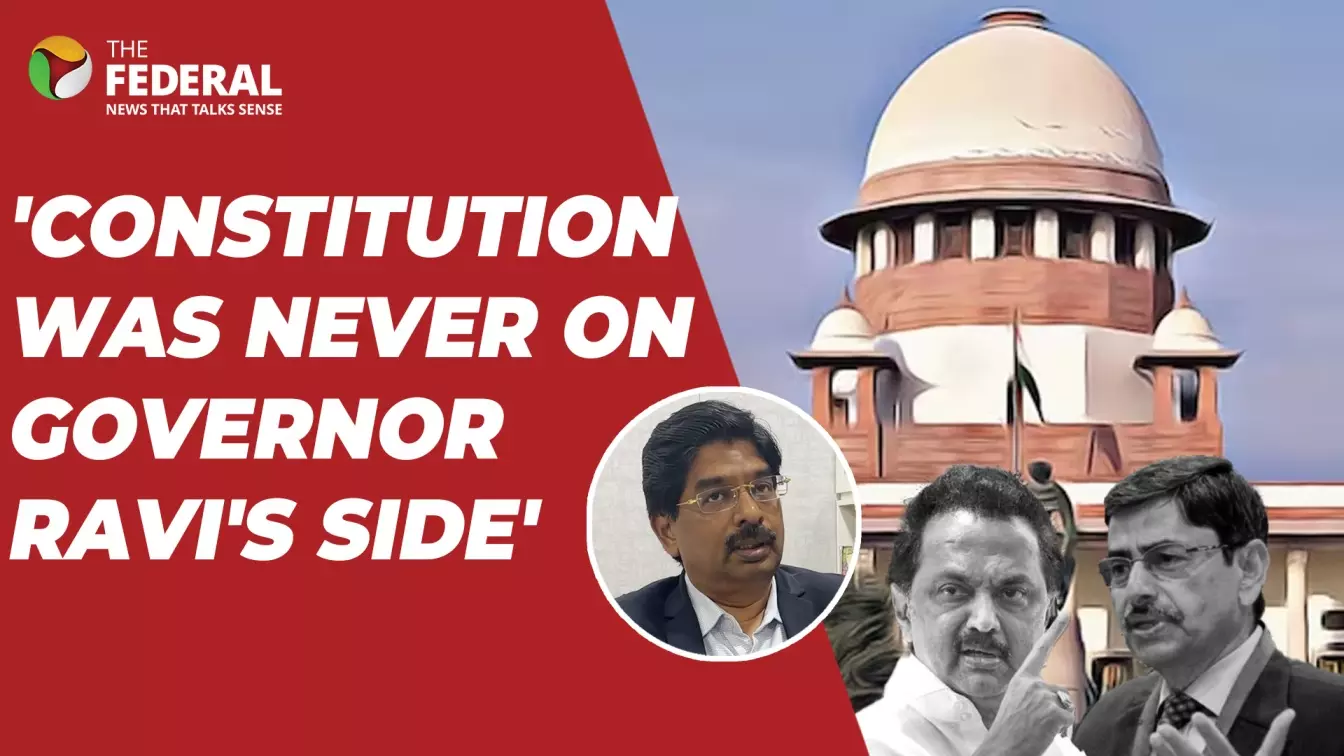
DMK MP P Wilson Interview
DMK MP P Wilson Interview | Why did Supreme Court slam RN Ravi?
DMK MP P Wilson shares his thoughts on why Governor RN Ravi drew flak from the SC for blocking TN bills. Why did the court call his actions illegal? Watch this exclusive

In a landmark interview with The Federal, DMK Rajya Sabha MP and senior advocate P Wilson detailed the Supreme Court’s powerful judgment against Tamil Nadu Governor RN Ravi’s prolonged delay in assenting to 10 bills passed by the state legislature. Wilson described the judgement as a watershed moment in Indian constitutional law, particularly clarifying the role of governors under Article 200.
The court concluded that the governor had no independent discretion and that all his functions—including assenting, withholding, or forwarding a bill—must be performed based on the aid and advice of the Council of Ministers. “Governor has no independent veto, no pocket veto. Even forwarding a bill to the President must be guided by the Cabinet,” Wilson said.
The apex court held that once a bill is re-enacted and returned by the Assembly, the governor is constitutionally bound to grant assent. The attempt by the governor to bypass this, by sending the bills to the President without consulting the cabinet, was declared “illegal and unconstitutional.”
Three options, no discretion
Elaborating on the powers under Article 200, Wilson clarified that a governor has only three choices when a bill is presented: grant assent, withhold assent, or reserve it for the President. However, even these options must be exercised on cabinet advice.
“The only exception is for certain types of bills reserved under specific provisions,” he said. He emphasised that the governor cannot act independently at any stage, debunking the notion that discretionary powers apply across the board. “He cannot write to the President without cabinet approval. Where is the power in the Constitution for that?” Wilson questioned.
The Supreme Court found the governor’s forwarding of bills to the President and the subsequent withholding of assent as unconstitutional. Consequently, the court declared that all 10 bills were “deemed to have been assented to,” invoking its extraordinary powers under Article 142.
Governor’s tactics
Wilson narrated the legal hurdles faced during the case. After the DMK-led government filed a writ petition in 2023, Governor Ravi swiftly withheld assent to the pending bills in what Wilson described as a calculated move to render the plea infructuous.
“He did not return the original bills, only a Xerox with a note that he’s withholding them. Someone likely advised him that this would kill the bills,” Wilson explained. However, the Tamil Nadu Assembly re-enacted the bills and sent them back, leaving the governor with no constitutional option but to assent. Instead, Ravi forwarded them to the President independently.
When asked about this contradiction, Wilson said, “This was our second major challenge. We had to amend the prayer again in the petition.”
SC's course correction
Following the governor’s controversial step, seven bills were rejected by the President, two remained undecided, and only one was approved. But the Supreme Court reversed all these developments.
“The court restored status quo ante and declared the bills as assented to. That’s the power of Article 142—to do complete justice,” Wilson affirmed. He cited the Perarivalan case and the Bihar and Uttarakhand Assembly dissolution matters as precedents where the SC used similar powers.
The judgement also criticised the governor’s letter to the President urging rejection of the bills without the Council of Ministers’ advice. “This is beyond his constitutional remit,” Wilson said, emphasising that the governor is bound by legislative intent and cabinet recommendations.
Impact on governance
The case highlighted the governance paralysis caused by the governor’s actions. Several files, including the appointment of the Tamil Nadu Public Service Commission chairman, corruption prosecution sanctions, and remission of sentences for 80 prisoners, remained unsigned.
“The governor acted as a roadblock, not as a friend, philosopher, or guide,” Wilson remarked. The appointment of vice-chancellors across more than 10 Tamil Nadu universities also stalled. The judgement now opens the path to resolving these logjams.
“The power of the chancellor is given by the legislature. It’s not constitutional; it’s statutory. He forgot that,” Wilson said, stressing that the governor's refusal to cooperate with Selection Committee deliberations further crippled the system.
A verdict for federalism
The Supreme Court's ruling sends a strong message on federalism, state autonomy, and the limits of gubernatorial discretion. “The Constitution never intended elected governments to spend their entire term waiting at the governor’s doorsteps,” Wilson said.
Referring to Article 200’s mandate to act “as soon as possible,” he said, “The governor acted as long as possible,” highlighting the absurdity of the delay. Wilson concluded by underlining that this verdict marks the first time in Indian history that the SC has deemed bills as assented without the governor’s formal nod.
This precedent-setting judgment is poised to have far-reaching implications, especially as similar disputes simmer in other states like Punjab, Kerala, Telangana, and Karnataka.
The content above has been generated using a fine-tuned AI model. To ensure accuracy, quality, and editorial integrity, we employ a Human-In-The-Loop (HITL) process. While AI assists in creating the initial draft, our experienced editorial team carefully reviews, edits, and refines the content before publication. At The Federal, we combine the efficiency of AI with the expertise of human editors to deliver reliable and insightful journalism.

